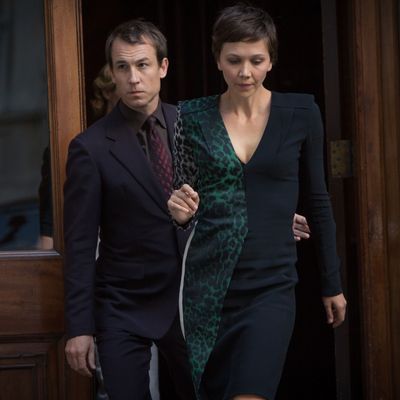
The miniseries The Honorable Woman, about an Israeli (Maggie Gyllenhaal) who runs her father’s weapons company and deals with the headaches and dangers that go with it, would stand out in any TV year, for its detail, its atmosphere, and the way it toys with the audience’s sympathies. But what makes it really unusual is the patience that it requires of viewers. This is 20th century storytelling, easygoing and deliberate, packed with detail, and not afraid to go silent and just observe people doing things, with the understanding that eventually you’ll figure out what they’re up to and what it all means.
As written and directed by Hugo Bick (The Shadow Line, Operation Good Guys), this miniseries is an espionage yarn of sorts, filled with sketchy characters imploring others to trust them, and shot through with a low-key but persistent paranoia of a sort that fans of early ‘70s thrillers (and late ‘70s and early ‘80s miniseries such as the Alec Guinness classics Tinker, Tailor, Soldier, Spy and Smiley’s People) will appreciate. In this shadowy world of politicians, military types, spies, and corporate movers and shakers, you can’t totally trust anyone, and everybody has a secret self (a reality laid out in an uncharacteristically too-blunt voice-over that recurs during each episode’s “previously on” montage). A doctor or limo driver or waiter could turn out to be an information thief or hired killer. The persistent threat of betrayal and violence makes even the quiet scenes unsettling. But The Honorable Woman is also a family drama about powerful, traumatized people. At certain key points — particularly in tonight’s pilot, which includes a public celebration followed by the private rebuke of an old family friend — it may remind you of the Godfather trilogy, only with a woman at its center.
Gyllenhaal’s Nessa Stein, a.k.a. Baroness Stein of Tilbury, is an Anglo-Israeli businesswoman based in London. Her father, a legendary arms manufacturer and Zionist, was assassinated 29 years earlier (timespans become increasingly important as the series flashes from period to period, like an illusionist shuffling cards in a deck and then showing you certain ones that’ll set up a trick later). Nessa took over the business after her brother Ephra (Andrew Buchan), their dad’s original replacement, quit for reasons that we will eventually learn. The Stein Group’s fortune was founded on weapons—on death. This is inherently problematic, and although Nessa quotes a righteously belligerent line in an early scene (“My father believed that no home could survive unless it had strong walls”) the show positions her as a transitional figure in the family’s history, like Michael Corleone (who was obsessed with making the family “legitimate,” and who in the third Godfather donated billions to the Catholic church). She’s gotten the company involved in initiatives that at first seem motivated out of guilt, or a desire to somehow cleanse her family’s fortune. These include wiring West Gaza for easy Internet access and sponsoring poor Palestinians who want to study classical music and build bridges through their art.
It’s not that simple, though. A lot of people seem to want to control Nessa, terrorize her into silence, or just kill her. The first episode starts with a bloody murder that defines the Stein family’s temperament, and ends with a crime that could make Nessa, her relatives or her advisers lose their cool and lash out (which might be the whole point of the outrage; somebody’s been reading The Wretched of the Earth, perhaps). It seems like more than a sympathy-building plot point when we learn that Nessa and Ephra’s mother died giving birth to Nessa, leaving their soon-to-be-murdered father to raise them. In time the Stein siblings’ damned-if-you-do, damned-if-you-don’t decisions (and their often brutal repercussions) make their orphan status seem like metaphor for the very existence of Israel (a nation founded after the Holocaust). But the show’s political leanings are harder to gauge than that description might make it sound. It has sympathy for the Steins, but it also shows them behaving with a cool, even cruel detachment, and acting of personal pain in ways that are only going to make the Arab world (which has its own history of trauma) harder to negotiate with, or appease, or defeat. “The story you’ve just stepped into, it stretches back thousands of years,” says a military officer, a warning that seems partly directed at the viewer.
Not every aspect of The Honorable Woman works, and since parsing its failures would mean giving away major plot twists, I’ll keep things vague here. Suffice to say that Nessa has more than one dark secret with its own political-metaphoric dimension; that the slow-quiet-beautiful approach sometimes crosses the line into arty indulgence; and that the early episodes don’t use the great reactive character actor Stephen Rea (as Sir Hugh Hayden-Hoyle, the outgoing head of MI6’s Mideast desk) as effectively as they could have. (Bick makes him look even more like a hound dog than usual; when he opened his mouth for the first time, I half-expected Droopy’s voice to come out.) But all in all, this is an impressive piece of work, absorbing provided that you’re willing to meet it on its own storytelling terms. And it’s packed with fine Hitchcockian flourishes (including a nifty bit of crosscutting between two conversations, one of which takes place over a chess table), as well as images that have an eerily abstract beauty: a close-up of a billowing curtain sprayed by Jackson Pollock–style blood spatters; a shot of a woman’s hand smoothing a red and blue comforter; overhead images of elegant spiral staircases, their Vertigo-whorls receding into infinity. Soon enough, the routine (for this world) phrase “Is he cleared?” acquires an ethical dimension. Nobody is ever cleared. Some stains can’t be washed out.


